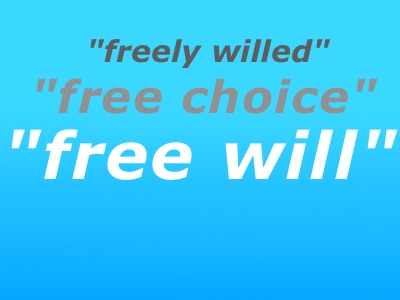What bothers me more than anything about the entire “addiction” debate is that the scientists at the forefront of it do not believe in free will. Nora Volkow, as the head of the National Institute on Drug Abuse is the most visible and most influential addiction scientist in the world. As such, she’s the most prominent pusher of the idea that heavy substance use is a behavior that people are not in control over; a behavior which we do not choose; a behavior that simply happens to us without our permission and which we are powerless to stop on our own. She says that the mechanism of free choice/free will is broken in “addicts.”
Notice my use of quotes in that paragraph around the terms “addiction” and “addicts”? These are called scare quotes, and they indicate that the author (in this case, me) doesn’t really like the term they’re using, or that they think the term is altogether wrong or meaningless. I don’t think addiction, as we know it, is a valid concept – thus I use scare quotes when using it. Why would I use the term addiction then? To communicate with my readers where they’re at – they believe in the boogie monster of addiction.
The google entry for scare quotes reads:
quotation marks used around a word or phrase when they are not required, thereby eliciting attention or doubts.
“putting the term “global warming” in scare quotes serves to subtly cast doubt on the reality of such a phenomenon”
So what should I make of the fact that Nora Volkow, head of the National Institute on Drug Abuse (NIDA) uses scare quotes when referring to free will? That’s what she did in a blog post about Phillip Seymour Hoffman’s overdose death last year, a few times:
Even if taking a drug for the first time is a “free” choice, the progression of brain changes that occurs after that involves the weakening of circuits…
Why is she wary of saying the first choice is free? Why is she backtracking on a narrative she’s used countless times, and which she repeats within this same blog post (that substance use starts out as voluntary and then becomes involuntary)? Why is the word free controversial here? Why does she double down on it?:
Moreover, even the “freely willed” first choice to take a drug cannot be the basis for judgment and stigma against people suffering from addictions.
There it is again. This time freely willed is in the scare quotes indicating that Nora Volkow doesn’t like the term here for some reason. What does she have against the concept of free will?:
Speaking of “free choice” is simply not useful when trying to understand an individual’s addiction or its consequences, as addiction is precisely a disease that disrupts the neuronal circuits that enable us to exert free choice.

Now in that last quote, she scare quotes free choice the first time she mentions it. But I’m puzzled by the lack of scare quotes around her second usage of free choice. She’s done so much to indicate throughout this blog post that she dislikes the concept of free will and free choice, and then she speaks of addiction as a “disease that disrupts the neuronal circuits that enable us to exert free choice.”
Are we supposed to believe her when she asserts that addiction disrupts an ability (free will/choice) that she has repeatedly indicated she doesn’t really believe in?
To be clear, Volkow has been on a decade long media tour spreading the idea that repeated drug use is voluntary at first (freely willed/chosen – i.e. within the self-control of the individual), but then becomes involuntary, or uncontrolled by the individual after enough repetition and development of the disease of addiction. There have been plenty of other clues in Volkow’s writings and other public statements that demonstrate she doesn’t believe in free will to begin with. It has been clear that she is a determinist through and through to me, but now this is just glaring – she uses scare quotes around free will terms to indicate she doesn’t even take those terms as serious or legitimate objectively meaningful terms. If this is the case, then that makes all of her previous presentations cynically dishonest (and this presentation within this very article where she uses the scare quotes).
You can’t argue that addiction represents a destruction or loss of free will when you don’t believe that people have free will to begin with.
Interesting point. All of her decrees are filled with contradiction. For example, she recently described how she became interested in addiction after her grandfather died of ‘alcoholism’. It was obvious to a child that he killed himself, but she much prefered the explanation that an external substance somehow took over his mind and killed him. She spent her professional career trying to prove it. And in an interview on The Fix she complains that people use religious-based free-will arguments to debunk the ‘science’ of addiction, while admitting that religious ‘treatment’ is nevertheless effective against it. There is no indication that she recognizes any self-deception in her own thinking, the irony being that she is diagnosing exactly that defect in others. It’s pretty funny and ironic. Her grandfather (Leon Trotsky) might be accused of the s
… same ‘character defect’.